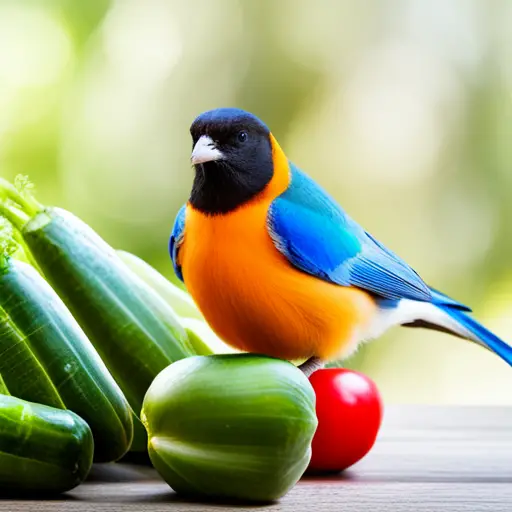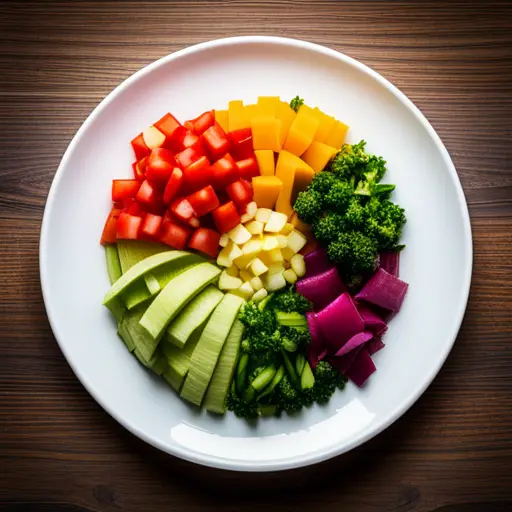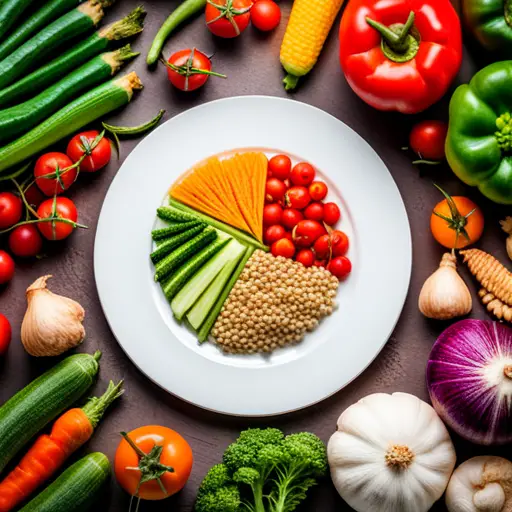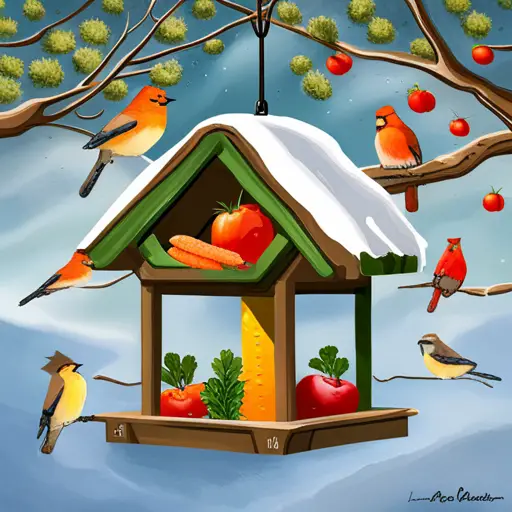Did you know that a balanced diet is just as important for birds as it is for humans?
In fact, according to a recent study, over 80% of bird owners are unaware of the proper diet for their feathered friends.
While seeds and pellets are a great source of nutrition for birds, it’s important to supplement their diet with fresh fruits and vegetables to ensure they receive all the necessary vitamins and minerals.
Adding vegetables to your bird’s diet can be a fun and rewarding experience for both you and your feathered companion.
Not only do vegetables provide essential nutrients, but they also offer a variety of textures and flavors to keep your bird engaged and stimulated.
In this article, we’ll explore the benefits of a balanced diet for birds, safe and nutritious vegetables to incorporate into their diet, and how to properly prepare these vegetables for your feathered friend.
So, let’s get started on the path to a healthier, happier bird!
Key Takeaways
- A balanced diet is crucial for bird health and well-being, and deficiencies in nutrients can lead to serious health problems.
- Fresh fruits and vegetables are essential components of a bird’s diet, as seeds and pellets alone are not enough.
- Vegetables provide essential nutrients and offer variety in texture and flavor, with leafy greens and cruciferous vegetables being safe and nutritious options.
- Different birds may prefer different vegetables, so offering a variety and adjusting portion size and frequency of servings based on bird size, age, and activity level is important.
The Importance of a Balanced Diet for Birds

You gotta make sure your birds are getting a balanced diet, it’s crucial for their health and well-being. Providing them with a variety of foods ensures that they get the necessary nutrients for their growth and development.
Birds need a combination of proteins, carbohydrates, fats, vitamins, and minerals to maintain their health. A diet lacking in any of these nutrients can lead to deficiencies and health problems.
The benefits of variety in your bird’s diet are numerous. Different types of foods provide different nutrients that are essential for their health. For example, seeds are high in fat and provide energy, while fruits and vegetables are high in vitamins and minerals.
Additionally, a varied diet keeps your bird interested and engaged in their food, preventing boredom and ensuring they are getting the necessary nutrients. On the other hand, the risks of deficiency can lead to a weakened immune system, poor feather quality, and even death.
It’s important to provide a balanced diet to ensure your bird’s optimal health and well-being. Let’s move on to the next section and learn about safe and nutritious vegetables for birds.
Safe and Nutritious Vegetables for Birds

When it comes to feeding your feathered friends, adding some leafy greens to their plate can give their diet a healthy boost, like a refreshing splash of water in a dry desert. Vegetables are a great way to provide your birds with nutritious complements that can improve their overall health and well-being.
Here are some safe and nutritious vegetables that can be added to your bird’s diet:
- Leafy Greens: These include kale, spinach, collards, and Swiss chard. They’re packed with essential vitamins and minerals, such as vitamin A, C, and K, which can help boost your bird’s immune system.
- Cruciferous Vegetables: These include broccoli, cauliflower, and Brussels sprouts. They’re rich in antioxidants and can help prevent cell damage in your bird’s body.
It’s important to note that not all vegetables are safe for birds. Avoid feeding your birds onions, garlic, and avocado as they can be toxic to them.
In the next section, we’ll discuss how to prepare vegetables for birds without compromising their nutritional value.
How to Prepare Vegetables for Birds

To get the most nutritional value out of leafy greens and cruciferous veggies for your feathered friend, it’s important to know how to prepare them. Firstly, make sure to thoroughly wash the vegetables before serving them to your bird. This will help remove any dirt or pesticides that may be present on the surface of the vegetables.
Next, consider the different preparing methods for each vegetable variety. For example, some vegetables may be served raw, while others may need to be cooked or steamed. Additionally, you can chop or shred the vegetables to make it easier for your bird to eat.
By taking the time to properly prepare the vegetables, you’ll ensure that your bird is getting the most nutritional benefit from their diet. Now, let’s move on to how much and how often to feed vegetables to your feathered friend.
Without overstepping your boundaries, it’s important to keep in mind that birds have different dietary requirements than humans. So, it’s crucial to understand how much and how often to feed vegetables to your feathered friend.
How Much and How Often to Feed Vegetables to Birds

It’s important to strike a balance when incorporating leafy greens and cruciferous veggies into your feathered friend’s diet, so don’t put all your eggs in one basket. The frequency and portion size of vegetable servings should depend on your bird’s size, age, and activity level.
As a general rule, a small bird such as a budgie or canary can have a teaspoon of chopped veggies per day, while a larger bird like a parrot or macaw may require up to a tablespoon. You can offer vegetables as a snack or mix them into your bird’s regular meal.
To keep your bird interested and satisfied, it’s important to offer a variety of vegetables. While some birds may enjoy carrots and broccoli, others may prefer bell peppers and kale. Try different colors, textures, and flavors to see what your bird likes best. Remember to wash and chop the vegetables into bite-sized pieces and remove any seeds or pits that may be toxic to birds.
By providing a balanced and varied diet, you can help ensure your bird’s overall health and well-being.
As you continue to explore the world of bird nutrition, keep in mind that vegetables are just one aspect of a healthy diet. In the next section, we’ll discuss other dietary considerations for birds to help you provide a well-rounded and nourishing meal plan for your feathered friend.
Other Dietary Considerations for Birds

Now let’s talk about other dietary considerations for your feathered friends. You may already know that protein plays a crucial role in their health and well-being, but did you know that supplementing their diet with fruits and nuts can also be beneficial?
In this section, we’ll delve into these key points to help you ensure that your bird is getting all the nutrients they need.
The Role of Protein
You’ll need to ensure your bird’s diet includes enough protein to support their health and well-being. This is especially important for vegetarian birds who don’t consume insects or meat.
While seeds and grains are a common source of protein, they may not provide all the essential amino acids your bird needs. Additionally, some birds may have difficulty digesting certain seed shells.
Luckily, there are protein alternatives available for birds, such as cooked beans, lentils, and tofu. These foods are not only protein-rich but also provide other essential nutrients like iron and calcium. However, it’s important to introduce new foods gradually and monitor your bird’s reaction to them.
With a balanced diet that includes protein alternatives, your bird can maintain good health and energy levels.
Transitioning into the subsequent section about supplementation with fruits and nuts, it’s important to note that while protein is important, your bird also needs a variety of other nutrients. This includes vitamins and minerals that can be found in fruits and nuts. By incorporating a variety of foods into your bird’s diet, you can ensure they receive all the necessary nutrients for optimal health.
Supplementation with Fruits and Nuts
Adding fruits and nuts to your feathered friend’s meals can provide a tasty and nutritious boost to their diet. Just like with vegetables, it’s important to offer bird safe options that are free from pesticides and other harmful chemicals. Fruits such as apples, bananas, and berries are great options, while nuts like almonds, walnuts, and pistachios can also be included in small amounts.
When it comes to frequency of feeding, it’s best to offer fruits and nuts as occasional treats rather than a daily staple. This not only prevents overindulgence, but also ensures that your bird is still getting a balanced diet with a variety of nutrients. As with any new food, it’s important to introduce fruits and nuts gradually and monitor your bird’s reaction. With a little bit of experimentation, you’ll find the perfect balance of fruits and nuts to complement your bird’s diet.
| Fruits | Nutrients | Notes |
|---|---|---|
| Apples | Vitamin C, Fiber | Remove seeds and core |
| Bananas | Potassium, Vitamin B6 | Peel before serving |
| Berries | Antioxidants, Fiber | Remove stems and leaves |
This table provides a quick guide to some bird safe fruits and their nutrients. Remember to always wash and prepare fruits and nuts before serving to your feathered friend. By incorporating a variety of fruits and nuts into your bird’s diet, you can provide them with a tasty and nutritious supplement to their regular meals.
Conclusion
Congratulations on taking the first step towards ensuring your feathered friend’s well-being! By incorporating vegetables into your bird’s diet, you’re providing them with essential nutrients and a balanced diet that’ll keep them healthy and happy.
Did you know that in the wild, birds spend up to 80% of their day foraging for food? Unfortunately, in captivity, they don’t have the same opportunities to search for their own food. This is why it’s crucial to provide them with a variety of nutritious foods, including vegetables, to keep them healthy and engaged.
In fact, a study conducted by the University of California found that birds that fed on a varied diet, including vegetables, lived longer and had better overall health than those that didn’t. So, don’t hesitate to add some leafy greens, carrots, and other vegetables to your bird’s diet today!
